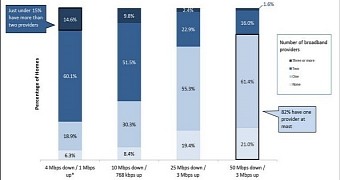The FCC seems to finally see the truth of the situation the United States is in – there is no broadband competition.
During a speech he gave yesterday and which was streamed online, Wheeler admitted that meaningful competition for high-speed broadband was lacking and there was a need for more competitive choices for faster and better Internet connections.
The situation is so grim, in fact, that about three quarters of American homes don’t really have a choice when it comes to the network they get connected to, something that is otherwise essential for 21st century economics and democracy.
“Stop and let that sink in: three-quarters of American homes have no competitive choice for the essential infrastructure for 21st century economics and democracy. Included in that is almost 20 percent who have no service at all,” Wheeler said.
This is a major issue because it means that customers that are unhappy with one ISP’s services don’t really have other options than sticking around. In fact, when talking about how the Comcast and Time Warner Cable merger was such a good idea, execs from the company said there would be no competition issue between the two because their networks don’t really overlap, which says a lot about the broadband status in the US.
Wheeler wants to make some changes that will fix these issues. First of all, he said that the FCC would block mergers that reduce competition, while also implementing regulation that supports a free and open Internet.
The commission will also work to implement some new rules to encourage access for all providers to wireless spectrum in FCC auctions that will happen in the future. Wheeler also wants to fight against state laws that prohibit citizens from offering their own broadband services to others and redirecting funds to ensure that people in rural areas of the United States get the same access to high-speed broadband as city folks.
While companies such as Comcast, AT&T, Time Warner Cable and Verizon claim that there’s plenty of competition in the broadband market and that there’s no need for much input from the FCC, it seems that the situation is far from ideal. Wheeler waved off such statements, especially in relation to wired broadband, saying that speed is important.
“Four megabits per second isn't adequate when a single HD video delivered to home or classroom requires 5Mbps of capacity. This is why we have proposed updating the broadband speed required for universal service support to 10Mbps,” Wheeler said, explaining his position on the matter.

 14 DAY TRIAL //
14 DAY TRIAL //